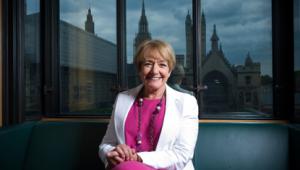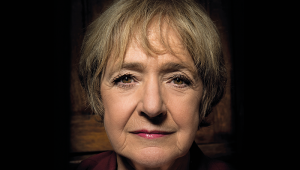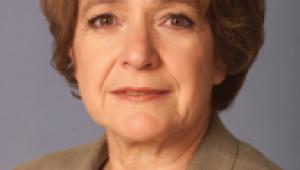By Lucy Philips
25 June 2010
There’s a frankness about Labour MP Margaret Hodge, which has contributed to the ups and downs of her 40-year political career. She rose to the top of local government, leading the London Borough of Islington for ten years before becoming MP for Barking in 1994. She held ministerial posts for all but one of the 13 years that Labour was in power – taking a year out to care for her terminally ill husband.
But her stint as the first children’s minister in the early 2000s was dogged by her response decades earlier to an inquiry into a child abuse scandal in Islington. As employment minister a few years later, she controversially suggested that former MG Rover workers could find jobs at Tesco.
Then in 2006 her candid remarks about local racial tensions were blamed for helping the far-Right British National Party gain 12 seats during council elections in her constituency, making it the main opposition in the borough and prompting calls for her resignation.
But recent weeks have seen her win two very important, life-changing battles. First, she trounced the BNP in May’s general election, doubling her majority and seeing off a high-profile challenge from leader Nick Griffin.
Shortly after, she became the first elected chair of the Public Accounts Committee, claiming one of the most influential backbench roles in the Commons and beating off stiff competition from five other Labour MPs.
As she prepares to move into her new office, one of Westminster’s finest, Hodge is still buoyant from the BNP triumph. ‘Beating the BNP wasn’t something we did in five minutes, it took us four years of dedicated endeavour... everything we did was about reconnecting mainstream politicians to local people,’ she tells Public Finance.
Moreover, she claims that many of her critics now believe she was right all along – Labour had failed to deal with the local housing and employment problems created by huge, sudden influxes of immigrants. She feels a consensus has begun to emerge on her previously contentious view that economic migrants ‘should have to put into the system’ before they are entitled to ‘rationed’ public services such as social housing and benefits.
‘There ought to be rules that reflect your link to your local community and the length of your residence in the local community before they can access what is a limited public good.... What tends to happen with quite a lot of the stuff I’ve said is that I’ve been a little bit before my time,’ she says.
This straight-talking approach to such thorny issues positions her well for life as PAC chair, and Hodge cannot hide her excitement about her ‘dream job’ – albeit in Opposition. She describes her own credentials: ‘I’ve always gone for consensus politics and persuasion rather than confrontation. It doesn’t mean I’m not tough and not clear in what I think but I’ve always worked to try and bring people to that consensual view... I’m good at squirrelling away, I’m a person who wants to get things done.’
She also has no doubts about the scale of the challenge, describing it as ‘relentless’. Her predecessor Edward Leigh revealed in March that the PAC took evidence on 420 separate government projects and programmes during his nine years at the helm. As spending cuts bite, demands will only intensify for the committee, expected to begin sitting in July.
The first task Hodge has set herself is a postmortem of the Labour government’s public spending – something she is well aware might prove uncomfortable reading for the Labour Party. ‘Don’t be seduced by the myth that it was all bad. Inevitably during the first couple of years your focus will be on what the last government did, and I think lessons learned are really important if you care about the quality, efficiency and effectiveness of public services,’ she says.
But she denies claims from the new government that Labour was reckless in its spending. The investment in education and the NHS ‘transformed’ schools and hospitals, while the deliberate money put into capital projects in the run-up to the recession gave ‘a much softer landing’, keeping unemployment and house repossessions down. ‘That expenditure, which of course creates a deficit, was good,’ she says.
But she concedes: ‘I think we were right to spend, we were right to invest, but probably didn’t raise enough revenue for the level of expenditure that we wanted. I do also think we took the eye off the ball on public service reform.’
This is also one of the reasons she gives for this year’s election defeat. ‘In the latter days there was a tendency back towards the state as always being the doer rather than the enabler,’ she says, adding that while their leadership was ‘weak’ during the Brown years, ‘to blame that for losing the election is absurd. It’s much more complex.’
Hodge, who was one of Tony Blair’s nominators when he stood for the Labour leadership, is backing shadow foreign secretary David Miliband in the current contest. She declares him ‘the best person to be prime minister’, with ‘fantastic pragmatic gravitas’.
Whoever wins the contest, how they position the Labour party on public spending will be critical to its fortunes in the coming years, Hodge says. The new government is jeopardising economic growth by cutting the deficit too fast and too quickly, she insists. ‘We have to continue to say that growth really matters, growth is the way you come out of recession.’
Interestingly, she admits that the Opposition ‘haven’t really sussed the coalition yet’, offering only a few early observations: ‘Vince Cable looks so angry all the time that you can’t think he’s happy. Nick Clegg, his image is changing quite rapidly. But they’re in a honeymoon period, we’ve been there and had that. I think they handled the Bloody Sunday report fantastically.’
Hodge is also hoping to set up a joint PAC-Treasury select committee inquiry into the budget deficit. In a more radical move, she wants to open up the PAC to the public - although confesses her idea might not be workable. She advocates greater use of the website, saying it will be somewhere ‘that people can say have a look at this, it’s a load of rubbish, or this is working well, don’t let them chop it, or if you chop this it will have this effect’.
Hodge is insistent that nothing beats the opportunities and power that being in government creates, but her temperament is also undeniably well suited to the new job. ‘This is a new freedom... When you are a member of the government you are always constrained by collective responsibility, and every now and again I strayed a little bit on the edges and said things. Now I can say what I believe.’
25 June 2010
The new chair of the Public Accounts Committee has been dogged by controversy throughout her career. But Margaret Hodge tells Lucy Phillips that this role gives her the freedom she craves
There’s a frankness about Labour MP Margaret Hodge, which has contributed to the ups and downs of her 40-year political career. She rose to the top of local government, leading the London Borough of Islington for ten years before becoming MP for Barking in 1994. She held ministerial posts for all but one of the 13 years that Labour was in power – taking a year out to care for her terminally ill husband.
But her stint as the first children’s minister in the early 2000s was dogged by her response decades earlier to an inquiry into a child abuse scandal in Islington. As employment minister a few years later, she controversially suggested that former MG Rover workers could find jobs at Tesco.
Then in 2006 her candid remarks about local racial tensions were blamed for helping the far-Right British National Party gain 12 seats during council elections in her constituency, making it the main opposition in the borough and prompting calls for her resignation.
But recent weeks have seen her win two very important, life-changing battles. First, she trounced the BNP in May’s general election, doubling her majority and seeing off a high-profile challenge from leader Nick Griffin.
Shortly after, she became the first elected chair of the Public Accounts Committee, claiming one of the most influential backbench roles in the Commons and beating off stiff competition from five other Labour MPs.
As she prepares to move into her new office, one of Westminster’s finest, Hodge is still buoyant from the BNP triumph. ‘Beating the BNP wasn’t something we did in five minutes, it took us four years of dedicated endeavour... everything we did was about reconnecting mainstream politicians to local people,’ she tells Public Finance.
Moreover, she claims that many of her critics now believe she was right all along – Labour had failed to deal with the local housing and employment problems created by huge, sudden influxes of immigrants. She feels a consensus has begun to emerge on her previously contentious view that economic migrants ‘should have to put into the system’ before they are entitled to ‘rationed’ public services such as social housing and benefits.
‘There ought to be rules that reflect your link to your local community and the length of your residence in the local community before they can access what is a limited public good.... What tends to happen with quite a lot of the stuff I’ve said is that I’ve been a little bit before my time,’ she says.
This straight-talking approach to such thorny issues positions her well for life as PAC chair, and Hodge cannot hide her excitement about her ‘dream job’ – albeit in Opposition. She describes her own credentials: ‘I’ve always gone for consensus politics and persuasion rather than confrontation. It doesn’t mean I’m not tough and not clear in what I think but I’ve always worked to try and bring people to that consensual view... I’m good at squirrelling away, I’m a person who wants to get things done.’
She also has no doubts about the scale of the challenge, describing it as ‘relentless’. Her predecessor Edward Leigh revealed in March that the PAC took evidence on 420 separate government projects and programmes during his nine years at the helm. As spending cuts bite, demands will only intensify for the committee, expected to begin sitting in July.
The first task Hodge has set herself is a postmortem of the Labour government’s public spending – something she is well aware might prove uncomfortable reading for the Labour Party. ‘Don’t be seduced by the myth that it was all bad. Inevitably during the first couple of years your focus will be on what the last government did, and I think lessons learned are really important if you care about the quality, efficiency and effectiveness of public services,’ she says.
But she denies claims from the new government that Labour was reckless in its spending. The investment in education and the NHS ‘transformed’ schools and hospitals, while the deliberate money put into capital projects in the run-up to the recession gave ‘a much softer landing’, keeping unemployment and house repossessions down. ‘That expenditure, which of course creates a deficit, was good,’ she says.
But she concedes: ‘I think we were right to spend, we were right to invest, but probably didn’t raise enough revenue for the level of expenditure that we wanted. I do also think we took the eye off the ball on public service reform.’
This is also one of the reasons she gives for this year’s election defeat. ‘In the latter days there was a tendency back towards the state as always being the doer rather than the enabler,’ she says, adding that while their leadership was ‘weak’ during the Brown years, ‘to blame that for losing the election is absurd. It’s much more complex.’
Hodge, who was one of Tony Blair’s nominators when he stood for the Labour leadership, is backing shadow foreign secretary David Miliband in the current contest. She declares him ‘the best person to be prime minister’, with ‘fantastic pragmatic gravitas’.
Whoever wins the contest, how they position the Labour party on public spending will be critical to its fortunes in the coming years, Hodge says. The new government is jeopardising economic growth by cutting the deficit too fast and too quickly, she insists. ‘We have to continue to say that growth really matters, growth is the way you come out of recession.’
Interestingly, she admits that the Opposition ‘haven’t really sussed the coalition yet’, offering only a few early observations: ‘Vince Cable looks so angry all the time that you can’t think he’s happy. Nick Clegg, his image is changing quite rapidly. But they’re in a honeymoon period, we’ve been there and had that. I think they handled the Bloody Sunday report fantastically.’
Hodge is also hoping to set up a joint PAC-Treasury select committee inquiry into the budget deficit. In a more radical move, she wants to open up the PAC to the public - although confesses her idea might not be workable. She advocates greater use of the website, saying it will be somewhere ‘that people can say have a look at this, it’s a load of rubbish, or this is working well, don’t let them chop it, or if you chop this it will have this effect’.
Hodge is insistent that nothing beats the opportunities and power that being in government creates, but her temperament is also undeniably well suited to the new job. ‘This is a new freedom... When you are a member of the government you are always constrained by collective responsibility, and every now and again I strayed a little bit on the edges and said things. Now I can say what I believe.’



















